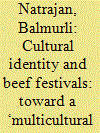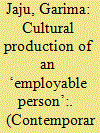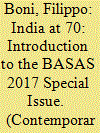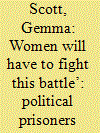|
|
|
Sort Order |
|
|
|
Items / Page
|
|
|
|
|
|
|
| Srl | Item |
| 1 |
ID:
161152


|
|
|
|
|
| Summary/Abstract |
Beef festivals are a dramatic and visible form of protest against the Indian government's ban on beef. These festivals are framed popularly as an assertion of Dalit ‘cultural rights’ and identity, with beef represented as the cultural food of Dalits. While it is clear that the beef ban is a casteist ban based on a Brahmanical food hierarchy, this paper explores the limits of resisting casteism through the assertion of caste-based cultural rights and identities, or as an assertion of an individual right to food choice. It argues that such a politics of resisting casteism runs into problems of the culturalization of caste, and limits the kinds of radical Dalit subjects and actors who could emerge as liberatory political subjects. The paper calls for reframing beef festivals as ‘antagonistic’ moments that articulate the degradation of Dalit labor in the politics of beef, reassert Dalit identity as an anti-caste identity rather than a cultural caste identity, and herald a politics of ‘multiculturalism against caste’.
|
|
|
|
|
|
|
|
|
|
|
|
|
|
|
|
| 2 |
ID:
161154


|
|
|
|
|
| Summary/Abstract |
Madrasas are increasingly being reformed across South Asia with the intended aim of ‘social change’ through mainstreaming its marginalized Muslim population. While the transformative change, as promised in policy and popular discourse, remains distant, a vernacular cultural variant of this ‘change’ is intimately felt in the changing subjectivities of the students. As future holders of degrees now recognized by the government, the students imagine themselves as ‘employable persons’. In so doing, they challenge their long drawn marginal position in the economy and society as ‘unemployable persons’. By separating ‘being employable’ from being employed, the students are social agents innovatively responding to the broader socio-cultural and political economy, to achieve an elevated status for themselves, despite their likely unemployment and continued socio-economic marginality. While the madrasa students fail in accessing social mobility, they reproduce their condition in an agentive manner – through contestation and ‘partial penetration’.
|
|
|
|
|
|
|
|
|
|
|
|
|
|
|
|
| 3 |
ID:
161149


|
|
|
|
|
| Summary/Abstract |
This introduction to the 2017 Annual Conference of the British Association for South Asian Studies offers an overview of the collection of selected articles presented at the conference. Overall, the Special issue consists of six articles, including four research articles addressing a wide range of topics spanning from the role of women during the Emergency rule (1975–1977) to the difficult relationship between minorities and the Hindu majority in recent years, and two viewpoint articles. These viewpoints touch on two extremely important and timely topics: Urvashi Butalia, who was the keynote speaker at the conference, looks at Partition and at the importance of survivors in preserving the memory of such a momentous event, whereas Deborah Sutton addresses the articulation of Hindu nationalist views in the scholarship of the ‘Ghent School’. The introduction to the Special Issue also highlights how the research presented in this collection can offer comparative insights to broader phenomena occurring in other regions alike.
|
|
|
|
|
|
|
|
|
|
|
|
|
|
|
|
| 4 |
ID:
161150


|
|
|
|
|
| Summary/Abstract |
Seventy years after the partitioning of India into two countries, India and Pakistan, the bitter legacies of that violent founding moment have not gone away. While explorations based on oral histories had begun to open up Partition histories, there is still a great deal to be done and the need to record the stories of survivors is urgent as more and more of them are dying out. But even as direct histories become more diffuse and elusive, other explorations have begun to open up as research moves into the hands of non academics, writers, theatre activists and others.
|
|
|
|
|
|
|
|
|
|
|
|
|
|
|
|
| 5 |
ID:
161155


|
|
|
|
|
| Summary/Abstract |
This article is concerned with the small but coherent lobby of political scholarship that has emerged from a lineage of research supervision which centres on the charisma and ideas of S. N. Balagangadhara, a philosopher from the Centre for the Comparative Science of Cultures (Vergelijkende Cultuurwetenschap) at the University of Ghent. In particular, it examines the deployment of his ideas in a spate of recent scholarly and social media declarations that reject the existence of caste and, by extension, caste discrimination. This scholarship – characterised by circular reasoning, self-referencing and a poverty of rigour – has established a modest, if contentious and poorly reviewed, presence in academic spheres of dissemination. The ‘Ghent School’ describes a group of scholars who rely conspicuously on Balagangadhara’s concept of ‘colonial consciousness’, a crude derivative of Said’s thesis of Orientalism. The Ghent School maintain that all extant scholarship on Hinduism, secularism and caste represents an endurance of colonial distortions that act to defame India as a nation. This politics of affront finds considerable traction in diasporic contexts but has little, if any, resonance when mapped against the far more complex politics of caste in India.
|
|
|
|
|
|
|
|
|
|
|
|
|
|
|
|
| 6 |
ID:
161156


|
|
|
|
|
| Summary/Abstract |
Given the tendency of nascent democracies to relapse, observers have debated how stable Myanmar’s political and economic transitions are and if the international community can offer any help. The books under review caution against treating Myanmar as a tabula rasa waiting to be inscribed with alien dreams. They uncover a complex institutional topography, where imported reform packages will do more harm than good. Indeed, the motivation for and the shape of Myanmar’s reforms are almost entirely indigenous. The decision to open-up the polity and economy was taken in the late 1980s. The army's inability to handle political dissent derailed the nascent reforms though and the subsequent international sanctions pushed Myanmar toward China. Eventually, the compulsion to reduce the ‘unbalanced,’ ‘asymmetric’ and ‘involuntary’ dependence upon China provided the trigger for reforms. The pace of reforms will, however, depend largely on domestic factors including the loosening of the army’s grip over avenues of socioeconomic mobility. The majority community’s Buddhist background will also play a major role in shaping Myanmar’s political future. It remains to be seen whether Buddhism will constrain Myanmar to follow the path of other Theravada Buddhist societies or enable it to evolve into a deliberative, transformational democracy.
|
|
|
|
|
|
|
|
|
|
|
|
|
|
|
|
| 7 |
ID:
161153


|
|
|
|
|
| Summary/Abstract |
In 2015, many states in India banned the production and consumption of beef, with several states implementing stricter enforcement of already existing beef bans. The rhetoric of the bans evokes the protection of Hindu sensibilities, which consider the cow sacred. It has been observed that the political ascendency of the Bharatiya Janata Party and its ideology of Hindu Nationalism give impetus to the bans lending force to political and cultural organisations involved in cow vigilantism. This article explores the Hindu sense of disgust associated with professions related to the skinning and tanning of rawhide as well as the consumption of beef and carrion, which renders the untouchable body polluted, denying it personhood. Taking the Dalit protests following an assault on four Dalit youth in Mota Samadhiyala village of Gujarat on 11 July 2016, this article focuses on the Dalit response, both by activists and poets, to the proscription against beef. While Dalit activists have protested against assaults on those disposing of dead cattle, it is in poetry that the Dalit response to the disgust associated with the consumption of beef and carrion finds expression. Dalit poets bring the polluting body to the centre; claiming personhood and forging a new aesthetic.
|
|
|
|
|
|
|
|
|
|
|
|
|
|
|
|
| 8 |
ID:
161151


|
|
|
|
|
| Summary/Abstract |
During India’s infamous period of Emergency (1975–1977), Indira Gandhi’s government criminalised opposition and used preventive detention legislation extensively to repress dissent. Existing scholarship on this policy and on the Emergency more broadly pays little attention to women’s experiences. This paper draws on a unique collection of letters sent to and from female political prisoners in Maharashtra, exploring their experiences of incarceration under this regime. It offers new insights into the scale on which authorities detained women in this state and highlights ways that these political prisoners actively resisted Emergency rule. The paper also challenges the idea that the prison was an entirely repressive space for the Emergency’s detenues. These letters document attempts to exert agency over constructions of the prison space, highlight its permeable boundaries and reveal lively communities and cultures of resistance.
|
|
|
|
|
|
|
|
|
|
|
|
|
|
|
|
|
|
|
|
|